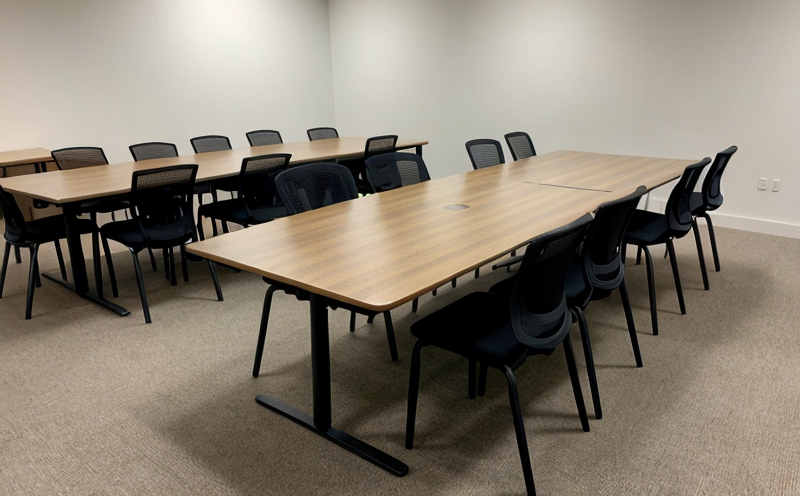ISO 7170 Furniture Storage Units Strength Durability and Stability Testing
The ISO 7170 standard is a critical specification that ensures the strength, durability, and stability of furniture storage units. This service focuses on evaluating how well these essential pieces of office or home furniture can withstand various stresses and strains over time. Compliance with this international standard guarantees quality performance under rigorous testing conditions.
Strength testing typically involves applying simulated loads to different parts of the storage unit, including legs, shelves, and drawer mechanisms, to assess their resistance against bending, flexing, or breaking. Durability tests simulate long-term use scenarios by subjecting the furniture to repeated cycles of load application and removal over extended periods.
Stability testing aims at ensuring that the storage units remain secure and stable during normal usage conditions, especially when filled with heavy loads. This includes assessing factors like tipping resistance and lateral stability under various weight distributions.
The process begins with careful preparation of each specimen according to ISO 7170 guidelines. Specimens are then subjected to a series of standardized procedures designed to mimic real-world usage patterns but at higher intensities than typical end-user experiences. For instance, the load application can vary based on the specific type and size of storage unit being tested.
Advanced instrumentation plays a crucial role in this testing process. High-precision measurement devices are used to record every aspect of the structural integrity during each phase of the test. These instruments provide accurate data points that help determine whether the product meets all specified requirements outlined by ISO 7170.
The results from these tests play an integral part in ensuring consistent quality across production batches, providing valuable insights for continuous improvement efforts within manufacturing processes. By adhering strictly to international standards such as ISO 7170, manufacturers can build customer trust while meeting stringent regulatory requirements worldwide.
Regular adherence to this standard also helps businesses stay ahead of competitors by maintaining high levels of product reliability and longevity. Moreover, it fosters innovation through ongoing research into more efficient materials and design solutions that enhance both functionality and safety features.
In conclusion, ISO 7170 testing is essential for any company involved in designing or manufacturing furniture storage units. It ensures not only compliance with international standards but also contributes significantly to brand reputation and consumer satisfaction by delivering robust, reliable products.
Benefits
Adhering to ISO 7170 can offer numerous advantages for furniture manufacturers. Firstly, it provides a benchmark against which all products are measured, ensuring uniform quality standards across various production facilities worldwide.
Secondly, successful completion of these tests demonstrates commitment to excellence and reliability, thereby enhancing the reputation of your brand among consumers and industry peers alike.
Thirdly, it opens up opportunities for international markets where compliance with this standard is mandatory. Many countries require imported furniture to meet specific safety regulations before being allowed entry into their markets.
In addition, regular testing helps identify potential weaknesses in current designs early on, allowing manufacturers to implement necessary improvements promptly and efficiently.
Lastly, participating in ISO 7170 testing can lead to cost savings over the long term by preventing costly recalls or returns due to product failures post-sale. This proactive approach ensures that any issues are addressed before reaching retail shelves, resulting in higher customer satisfaction rates overall.
Environmental and Sustainability Contributions
By ensuring that furniture storage units meet the stringent requirements of ISO 7170, manufacturers contribute positively towards environmental sustainability goals. The durability aspect of this standard encourages the use of high-quality materials which last longer without requiring frequent replacements.
This extended lifespan reduces waste generation throughout the product lifecycle, from manufacturing to disposal. Additionally, by promoting robust design practices, ISO 7170 helps minimize resource consumption during production processes.
Moreover, this standard supports efforts towards sustainable supply chains by encouraging responsible sourcing of raw materials and energy-efficient manufacturing techniques. Such initiatives align perfectly with broader corporate social responsibility (CSR) strategies aimed at reducing the environmental footprint associated with everyday products like furniture storage units.
Competitive Advantage and Market Impact
In today's competitive marketplace, being able to demonstrate compliance with recognized international standards such as ISO 7170 can give companies a significant edge over their competitors. Potential customers are increasingly looking for products that have undergone thorough quality assurance processes, making it easier for compliant firms to attract new business.
Furthermore, successful completion of these tests enhances brand credibility and trustworthiness among consumers who value safety, reliability, and durability when purchasing furniture storage units. This perception can translate into increased sales volume and customer loyalty.
Beyond mere compliance, engaging in ISO 7170 testing also allows manufacturers to stay ahead of emerging trends and technological advancements within the industry. Continuous improvement efforts driven by rigorous testing ensure that products remain relevant even as consumer preferences evolve over time.
Finally, participating in this standard can help establish a company's reputation as an industry leader known for innovation and excellence. Such recognition not only boosts market share but also opens doors to lucrative partnerships with other leading brands or organizations.





